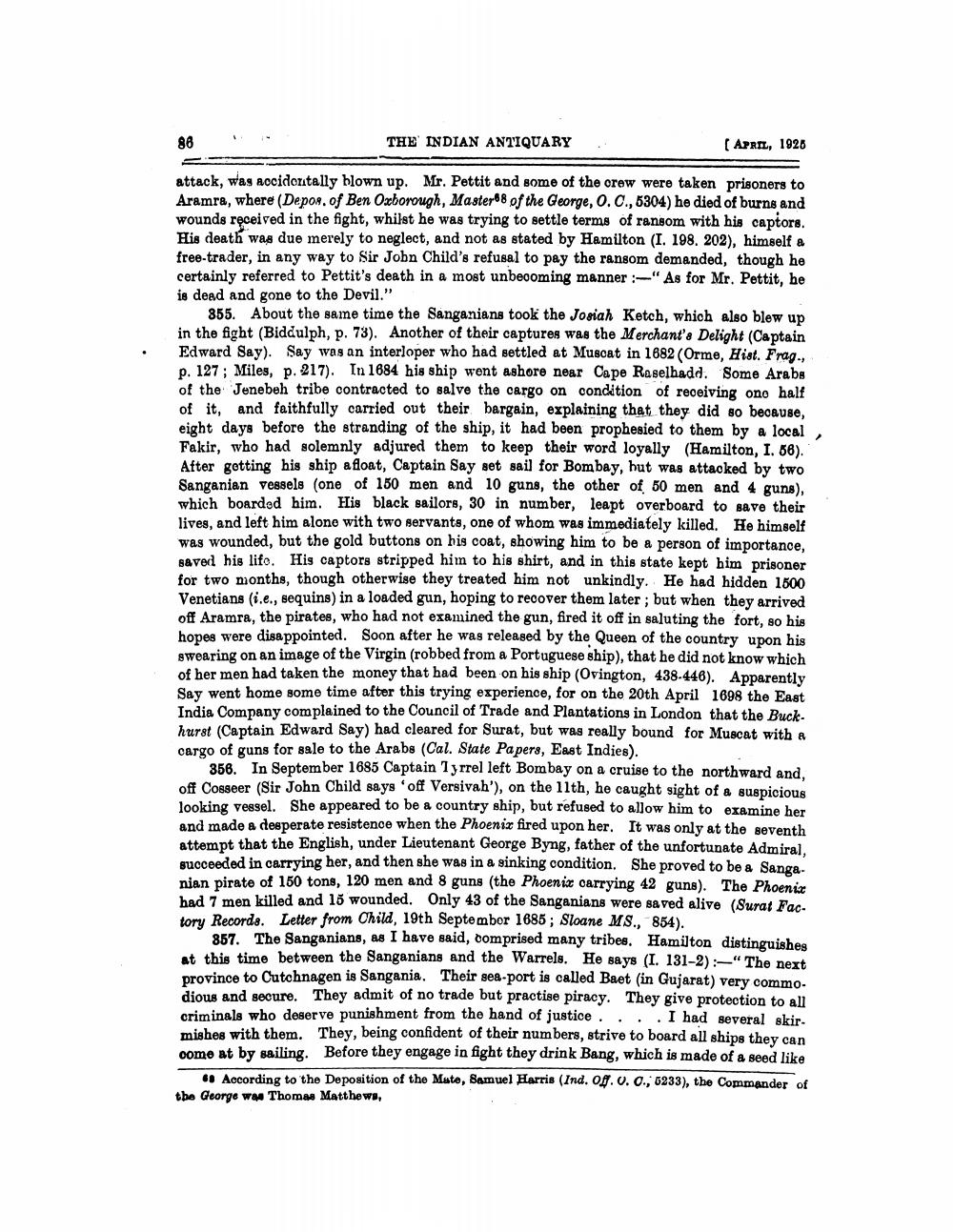________________
88
-
THE INDIAN ANTIQUARY
(APRIL, 1926
attack, was accidentally blown up. Mr. Pettit and some of the crew were taken prisoners to Aramra, where (Depos. of Ben Osborough, Masters of the George, 0. C., 5304) he died of burns and wounds received in the fight, whilst he was trying to settle terms of ransom with his captors. His death was due merely to neglect, and not as stated by Hamilton (I. 198. 202), himself a free-trader, in any way to Sir Jobn Child's refusal to pay the ransom demanded, though he certainly referred to Pettit's death in a most unbeooming manner :-"As for Mr. Pettit, he is dead and gone to the Devil."
855. About the same time the Sanganians took the Josiah Ketch, which also blew up in the fight (Biddulph, p. 73). Another of their captures was the Merchant's Delight (Captain Edward Say). Say was an interloper who had settled at Muscat in 1682 (Orme, Hist. Frag., p. 127: Miles, p. 217). In 1884 his ship went ashore near Cape Raselhadd. Some Arabe of the Jenebeh tribe contracted to salve the cargo on condition of receiving ono half of it, and faithfully carried out their bargain, explaining that they did so because, eight days before the stranding of the ship, it had been prophesied to them by a local Fakir, who had solemnly adjured them to keep their word loyally (Hamilton, I. 58). After getting his ship afloat, Captain Say set sail for Bombay, but was attacked by two Sanganian vessels (one of 150 men and 10 guns, the other of 50 men and 4 guns), which boarded him. His black sailors, 30 in number, leapt overboard to save their lives, and left him alone with two servants, one of whom was immediately killed. He himself was wounded, but the gold buttons on his coat, showing him to be a person of importance, saved his lifo. His captors stripped him to his shirt, and in this state kept him prisoner for two months, though otherwise they treated him not unkindly. He had hidden 1600 Venetians (i.e., sequins) in a loaded gun, hoping to recover them later ; but when they arrived off Aramra, the pirates, who had not examined the gun, fired it off in saluting the fort, so his hopes were disappointed. Soon after he was released by the Queen of the country upon his gwearing on an image of the Virgin (robbed from a Portuguese ship), that he did not know which of her men had taken the money that had been on his ship (Ovington, 438-446). Apparently Say went home some time after this trying experience, for on the 20th April 1698 the East India Company complained to the Council of Trade and Plantations in London that the Buck. hurst (Captain Edward Say) had cleared for Surat, but was really bound for Muscat with a cargo of guns for sale to the Arabs (Cal. State Papers, East Indies).
356. In September 1685 Captain Tyrrel left Bombay on a cruise to the northward and, off Cosgeer (Sir John Child says off Versivah'), on the 11th, he caught sight of a suspicious looking vessel. She appeared to be a country ship, but refused to allow him to examine her and made a desperate resistence when the Phoenix fired upon her. It was only at the seventh attempt that the English, under Lieutenant George Byng, father of the unfortunate Admiral. gucceeded in carrying her, and then she was in a sinking condition. She proved to be a Sanganian pirate of 150 tons, 120 men and 8 guns (the Phoenix carrying 42 guns). The Phoenix had 7 men killed and 15 wounded. Only 43 of the Sanganians were saved alive (Surat Factoru Records. Letter from Child, 19th Septembor 1685; Sloane MS.. 854).
857. The Sanganians, as I have said, comprised many tribes. Hamilton distinguishes at this time between the Sanganians and the Warrels. He says (I. 131-2):-" The next province to Cutehnagen is Sangania. Their sea-port is called Baet (in Gujarat) very commo. dious and secure. They admit of no trade but practise piracy. They give protection to all criminals who deserve punishment from the hand of justice ... I had several skir. mishes with them. They, being confident of their numbers, strive to board all ships they can come at by sailing. Before they engage in fight they drink Bang, which is made of a seed like
According to the Deposition of the Mate, Samuel Harris (Ind. 08.0.0., 6233), the Commander of the George ww Thomas Matthews,




